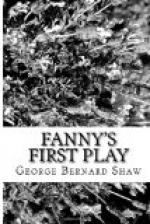Title: Fanny’s First Play
Author: George Bernard Shaw
Release Date: May, 2004 [EBook #5698] [Yes, we are more than one year ahead of schedule] [This file was first posted on August 9, 2002]
Edition: 10
Language: English
Character set encoding: ASCII
*** Start of the project gutenberg EBOOK Fanny’s first play ***
Scanned and proofed by Ron Burkey (rburkey@heads-up.com) and Amy Thomte.
This text was taken from a printed volume containing the plays “Misalliance”, “The Dark Lady of the Sonnets”, “Fanny’s First Play”, and the essay “A Treatise on Parents and Children”.
Notes on the editing: Italicized text is delimited with underlines (""). Punctuation and spelling retained as in the printed text. Shaw intentionally spelled many words according to a non-standard system. For example, “don’t” is given as “dont” (without apostrophe), “Dr.” is given as “Dr” (without a period at the end), and “Shakespeare” is given as “Shakespear” (no “e” at the end). Where several characters in the play are speaking at once, I have indicated it with vertical bars ("|"). The pound (currency) symbol has been replaced by the word “pounds”.
FANNY’S FIRST PLAY
BY BERNARD SHAW
1911
PREFACE TO FANNY’S FIRST PLAY
Fanny’s First Play, being but a potboiler, needs no preface. But its lesson is not, I am sorry to say, unneeded. Mere morality, or the substitution of custom for conscience was once accounted a shameful and cynical thing: people talked of right and wrong, of honor and dishonor, of sin and grace, of salvation and damnation, not of morality and immorality. The word morality, if we met it in the Bible, would surprise us as much as the word telephone or motor car. Nowadays we do not seem to know that there is any other test of conduct except morality; and the result is that the young had better have their souls awakened by disgrace, capture by the police, and a month’s hard labor, than drift along from their cradles to their graves doing what other people do for no other reason than that other people do it, and knowing nothing of good and evil, of courage and cowardice, or indeed anything but how to keep hunger and concupiscence and fashionable dressing within the bounds of good taste except when their excesses can be concealed. Is it any wonder that I am driven to offer to young people in our suburbs the desperate advice: Do something that will get you into trouble? But please do not suppose that I defend a state of things which makes such advice the best that can be given under the circumstances, or that I do not know how difficult it is to find out a way of getting into trouble that will combine




